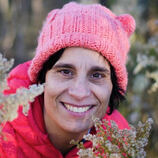|
By Holly Haggarty Nowadays, poets mostly write free verse. Some exceptions might be birthday cards, kid lit and rap, but awards are rarely meted out to metric verse. Historically, the 20th century was the moment when free verse was finally freed from the formal rules of style, thought to be stodgy and confining (by esteemed poets such as William Carlos Williams and Marianne Moore). So, no more counting metre and listing rhymes. No beat, no couplets? You might wonder, how then is free verse rhythmic? What are its rhythms? Is it rhythmic? Is it only saying that makes it so? Is there really any difference between poetry and creative non-fiction—don’t both interrupt conventional syntax while engaging figures of speech? Is poetry just a chopping of line? Compare this: O brother, put me in your pouch as you would a fresh, sweet locust-pod. For I am frail as a flask of glass, as a fine grey egg, or a slender rod, O brother; and I am the golden ring you wear on your finger so gladly. For God takes everything from you tomorrow, and gives me everything. with this: O BROTHER, put me in your pouch As you would a fresh, sweet locust-pod. For I am frail as a flask of glass, As a fine grey egg, or a slender rod, O brother; and I am the golden ring You wear on your finger so gladly. For God Takes everything from you tomorrow, and gives me everything. (D. H. Lawrence, “The Child and the Soldier”) Gerard Manley Hopkins, T.S. Elliot and William Carlos Williams all claimed that free verse seeks the inherently poetic rhythm of speech. If that’s so, is this a rhythm that may be heard, felt, shared, learned, known? Let’s think about this some more.  Holly Haggarty is an artist who loves to play with image, rhythm and word. Her poetry has been presented in many formats, as written, spoken and visual word, in local, national and international venues. Recently, her work has been included in the literary journals The Artery, Understory and Feathertale, as well as in the academic anthologies, Poetic Inquiry: Enchantment of Place (Vernon Press) and Ma: Materiality in Teaching and Learning (Peter Lang). She serves as poetry editor for Cloud Lake Literary.
0 Comments
|
NOWW Writers
Welcome to our NOWW Blog, made up of a collection of stories, reviews and articles written by our NOWW Members. |
Proudly powered by Weebly

 RSS Feed
RSS Feed